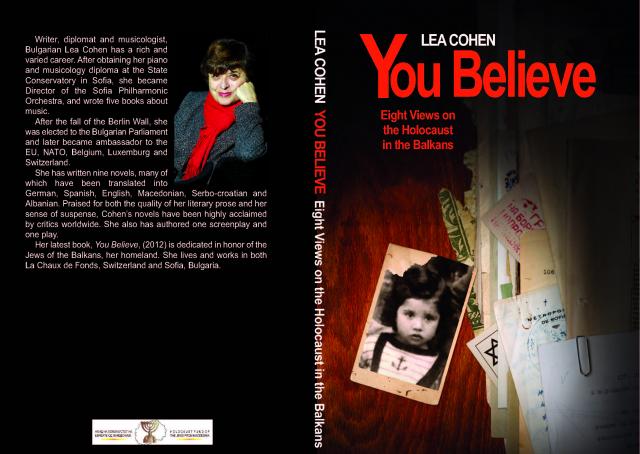Anastasia Balezdrova
Over the past month, the anti-Semitic speeches of representatives of the extreme right Golden Dawn party, including in parliament, have become more frequent. The provocative speech of party spokesman Ilias Kasidiaris, in which he said that there had been no Holocaust, has only brought to the fore the true ideology of the Nazi and xenophobic party.
 GRReporter has sought comments from Lea Cohen – a writer, musicologist, diplomat and politician who, late last year, published the book "You believe: Eight views on the Holocaust in the Balkans." In it the author describes the tragic events connected with the persecution of Jews in the Kingdom of Bulgaria and its neighbouring countries.
GRReporter has sought comments from Lea Cohen – a writer, musicologist, diplomat and politician who, late last year, published the book "You believe: Eight views on the Holocaust in the Balkans." In it the author describes the tragic events connected with the persecution of Jews in the Kingdom of Bulgaria and its neighbouring countries.
Lea Cohen presents historical facts about the fate of Jews in the Balkans during World War II and comments on the rise of far-right parties over the past few years.
Mrs. Cohen, the far-right Golden Dawn party in Greece openly denies the Holocaust. The party spokesman had explicitly stated in parliament that such a thing had never happened. What are the historical facts with regard to Greece?
Since the pro-Nazi Golden Dawn party entered the Greek parliament in 2012, unpleasant things have been happening there:
Party leader Nikolaos Michaloliakos had said, "the ovens and gas chambers of the Holocaust had never existed. That's a lie."
Another representative, namely deputy Ilias Kasidiaris, had allowed himself to read in parliament excerpts from "The Protocols of the Elders of Zion", which is a forged document prepared by the tsarist police in Russia around 1870 to justify the massacre of the Jewish population. Ilias Panagiotaros, another member of the party, had related to an Australian broadcaster that the party was preparing a military wing similar to the Hezbollah.
The scandalous acts of Golden Dawn whose members are using Nazi symbolism, quoting "Mein Kampf" (“My Struggle”) and preparing lists of Jews are, however, resisted by all democratic parties in Greece that have put Golden Dawn in isolation. There are numerous international responses, including calls from the Council of Europe, that the party should be banned. There is an appeal to the Greek parliament, signed by world famous intellectuals, Nobel laureates, writers and more, which calls for a ban on the party, as it is anti-Semitic, xenophobic and inhuman.
The latest developments related to the party's anti-Semitic acts date back to the memorial celebration of the 70th anniversary of the deportation and extermination of Salonica Jews. Representatives of the most influential Jewish organizations in the world had arrived in Thessaloniki for the celebration who were met with outrageous demonstrations of Golden Dawn.
Claiming that there was no Holocaust in the territory of Thessaloniki, whose Jewish population had been almost completely destroyed by the Germans, is not just a breach of etiquette. This is a crime, desecration of the memory of the deceased, this is mean tainting of a tragedy that Greece will always remember.

Recently, my book, "You believe: Eight views on the Holocaust in the Balkans" has been released. It was translated into English and Macedonian almost immediately. I have put on the cover of the book a picture of a four-year old girl who is a symbol of the Balkan Holocaust for me. The girl’s name is Eti Pardo Testa and she comes from the well-known Thessaloniki family Pardo Testa which was entirely destroyed in the gas chambers of Auschwitz. Only Eti’s brother David Pardo had miraculously saved himself. Greek neighbours of the family had kept the picture taken a month before the deportation along with some other family papers and gave them to David later. He settled in the U.S. and some circumstances related to the research on my book had taken me to his son Theodore Pardo in Florida, who allowed me to use and publish the picture.
The main theme of my book is the persecution of Jews in the Kingdom of Bulgaria and in its affiliates in Northern Greece and Macedonia as well as the Holocaust against Jews in the so-called "new Bulgarian territories".
My book addresses the issue of the fate of Greek Jews which varies across the country. Greece was divided between Germans, Italians and Bulgarians, and the Jews were respectively subjected to different regimes in these three areas. In the Italian part, including Athens, they had been saved from deportation because of the policy of the Italian administration which had not delivered them to the Germans and which had helped many of them emigrate (it is claimed that the Italians and Spaniards had issued over 18,000 exit visas to Greek Jews).
In the part occupied by the Germans, the retribution was brutal, especially in Thessaloniki which was once called the "Balkan Jerusalem" where 50,000 Jews had been brutally mistreated and deported to Auschwitz, from where only a few returned.